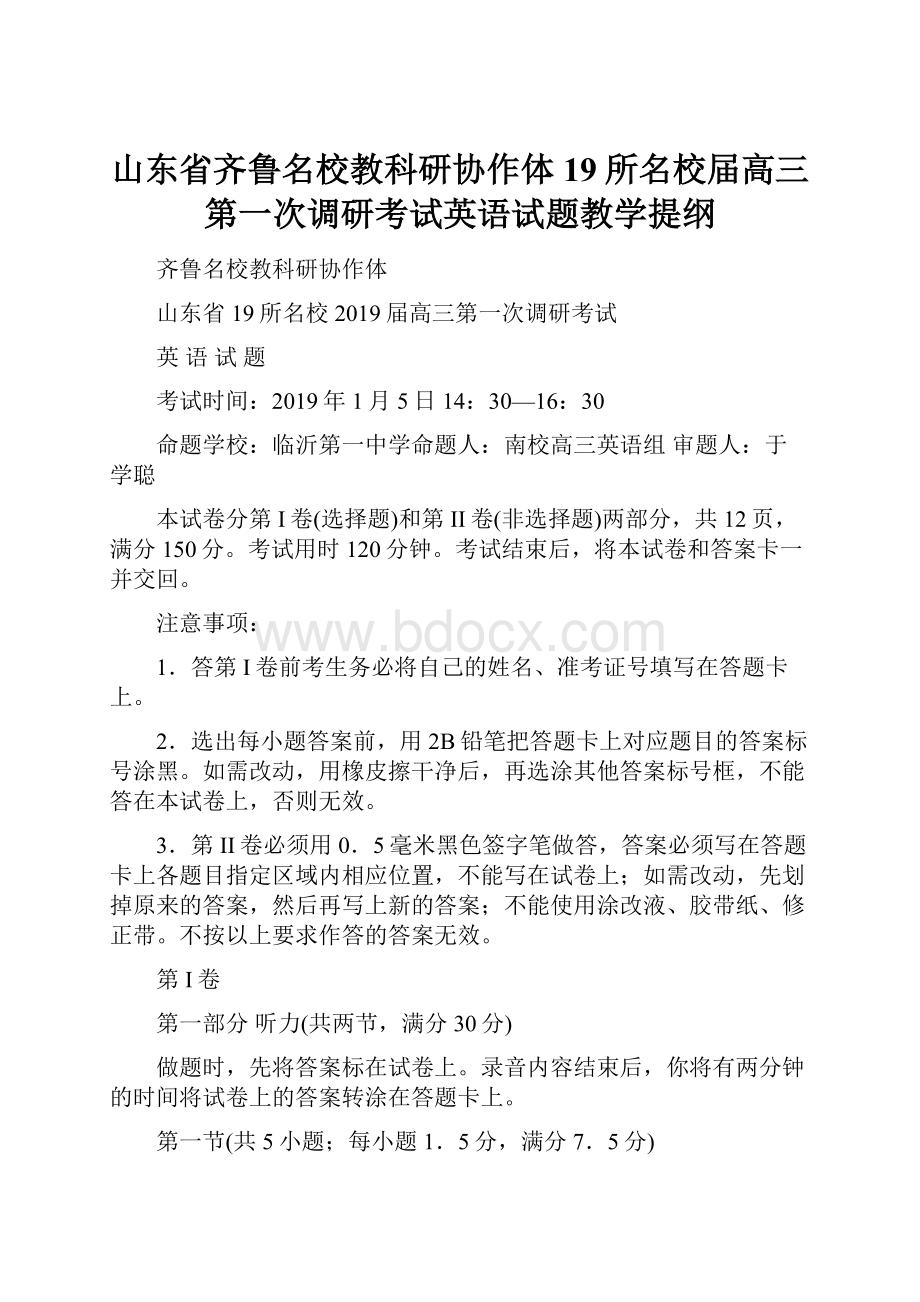山东省齐鲁名校教科研协作体19所名校届高三第一次调研考试英语试题教学提纲.docx
《山东省齐鲁名校教科研协作体19所名校届高三第一次调研考试英语试题教学提纲.docx》由会员分享,可在线阅读,更多相关《山东省齐鲁名校教科研协作体19所名校届高三第一次调研考试英语试题教学提纲.docx(20页珍藏版)》请在冰豆网上搜索。

山东省齐鲁名校教科研协作体19所名校届高三第一次调研考试英语试题教学提纲
齐鲁名校教科研协作体
山东省19所名校2019届高三第一次调研考试
英语试题
考试时间:
2019年1月5日14:
30—16:
30
命题学校:
临沂第一中学命题人:
南校高三英语组审题人:
于学聪
本试卷分第I卷(选择题)和第II卷(非选择题)两部分,共12页,满分150分。
考试用时120分钟。
考试结束后,将本试卷和答案卡一并交回。
注意事项:
1.答第I卷前考生务必将自己的姓名、准考证号填写在答题卡上。
2.选出每小题答案前,用2B铅笔把答题卡上对应题目的答案标号涂黑。
如需改动,用橡皮擦干净后,再选涂其他答案标号框,不能答在本试卷上,否则无效。
3.第II卷必须用0.5毫米黑色签字笔做答,答案必须写在答题卡上各题目指定区域内相应位置,不能写在试卷上;如需改动,先划掉原来的答案,然后再写上新的答案;不能使用涂改液、胶带纸、修正带。
不按以上要求作答的答案无效。
第I卷
第一部分听力(共两节,满分30分)
做题时,先将答案标在试卷上。
录音内容结束后,你将有两分钟的时间将试卷上的答案转涂在答题卡上。
第一节(共5小题;每小题1.5分,满分7.5分)
听下面5段对话,每段对话后有一个小题,从题中所给的A、B、C三个选项中选出最佳选项,并标在试卷的相应位置。
听完每段对话后,你都有10秒钟的时间来回答有关小题和阅读下一小题。
每段对话仅读一遍。
1.What’stheschoollike?
A.Itlacksstudents.B.Ithasvarioustextbooks.C.Itlackswaterandelectricity.
2.Whatarethetwospeakersdoingprobably?
A.Buyingabasketball.B.CheeringforOxford.C.Watchingafootballmatch.
3.Howmuchmoneydoesthemanwanttochange?
A.120.B.100.C.90.
4.Wherearethetwospeakersprobablynow?
A.Inarestaurant.B.Inagarage.C.Inahospital.
5.Whatisthemandoing?
A.Lookingforaschool.B.Buyingsomething.C.Lookingforaplacetolive.
第二节(共15小题;每小题1.5分,满分22.5分)
听下面5段对话或独白。
每段对话或独白后有几个小题,从题中所给的A、B、C三个选项中选出最佳选项,并涂在答题卡的相应位置。
听每段对话或独白前,你将有时间阅读各个小题,每小题5秒钟;听完后,各小题将给出5秒的作答时间。
每段对话或独白读两遍。
听第6段材料,回答第6至8题。
6.Wherewasthebuswhenthetwospeakersweretalking?
A.Atabusstop.B.Onthewaytothezoo.C.Atthezoo.
7.Howwillthemanrecognizethezoo?
A.Bybeingtoldbythewoman.
B.Bywatchingforthebiggate.
C.Bywatchingforthebusstophimself.
8.Whatcanwelearnfromtheconversation?
A.Themantookthebusbymistake.
B.Themanhadbeentothezoobefore.
C.Thebuswascrowdedwithpassengers.
听第7段材料,回答第9至10题。
9.Whatisthewoman?
A.Apart-timebabysitter.B.Ateacher.C.Anurse.
10.Whydoesthewomanaskthemantocomebackearlier?
A.ToputMarktobedearlier.
B.Tolethergohomeearlier.
C.Tohelpherwiththeexam.
听第8段材料,回答第11至13题。
11.Whatwasthemanlookingfor?
A.Recordsofguitarmusic.
B.Booksofmodernguitar.
C.Recordsofcountrymusic.
12.Whathappenedtotheman’srecords?
A.Heenjoyedthembutlostthem.
B.Hedamagedthemcarelessly.
C.Hisfathergotthemback.
13.Whereweretherecordswhenthemansawthem?
A.onashelf.B.Inthewindow.C.onthecounter.
听第9段材料,回答第14至17题。
14.Whatdaywasyesterday?
A.Monday.B.Thursday.C.Friday.
15.Whywasthewomanlatefortheappointment?
A.Theroadwascrowded.
B.Shewasstoppedbyapoliceman.
C.Hercarbrokedownhalfway.
16.Whathasthewoman’schildrendonetothedog?
A.Theyhurtthedog.
B.Theycoveredthedogwithfeathers.
C.Theygavethedogabath.
17.Whatwastheworstthingyesterdaytothewoman?
A.Sheforgotinvitingherbossandhiswifeover.
B.Sheforgottocookdinnerforherhusband.
C.Herbossandhiswifecametoherhouseunexpectedly.
听第10段材料,回答第18至20题。
18.Whoisthespeaker?
A.Anofficial.B.Atourist.C.Aguide.
19.Whencanyoucomeifyouwanttoseehowbreadwasbaked200yearsago?
A.OnSundayafternoon.B.OnTuesdaymorning.C.OnSaturdayafternoon.
20.WheredidSirHenrycomefrom?
A.England.B.TheUAS.C.France.
第二部分:
阅读理解(共两节,满分40分)
第一节(共15小题;每小题2分,满分30分)
阅读下列短文,从每题所给的四个选项(A、B、C和D)中,选出最佳选项,并在答题卡上将选项涂黑。
A
TheGloriaBarronPrizehonorsAmericanyoungpeoplefrom8tol8whohaveshownleadershipandcourageinpublicservice.Eachyeartenwinnerseachreceive$2,000tosupporttheirhighereducationortheirservicework.
EllieWen,18,wasvolunteeringatacommunitycenterinLosAngeles.Thecenterwassetuptohelpimmigrantfamilies.ShehappenedtomeetadultsinanEFL(Englishasaforeignlanguage)class.“WhenIsawthemstrugglinghard,IwonderedhowpeopleinpoorcountriescouldlearnEnglish,”Elliesaid.
SoshestartedaWebsite,“RepeatAfterUs”,wherepeoplecanlistentoEnglishandpracticetheiraccents.VolunteershavehelpedEllierecordmorethan6,600texts,includingAbrahamLincoln’s“GettysburgAddress”.
Hardworkpaysoff.ThereweresomanytimesthatElliewasdiscouraged,butshestucktoit.TheWebsitecrashedearlyon,andalltherecordingswerelost.Butvolunteersworkedtogethervigorouslytostartover,andthevisitorsreturnedtothesite.
“Justfollowyourideaandknowthattheworldissokind.Evenifyoudohavetrouble,peoplewillhelpyou,”Elliesaid.
“Iwasreallyexcitedthefirstmonth,whenwehad49visitors,”shesaid.Now,morethan480,000peoplefroma11overtheworldhavevisitedthesite.“Igete-mailsfromChina,Egypt,India,andBrazil.”Theysay,“Thankyousomuchforthisresource,we’vebeenwaitingforitforsolong!
”Ellielovesknowingsheishelpingsomanypeople.
GloriaBarronPrizewinnerslikeEllieareenthusiasticabouttheworktheydo.Andtheyencourageotherstojoininiftheyseeaneed.Anybodycanbenegative,butitneedssomebodybravetobepositive.Areyouthebraveone?
21.Choosetherightorderofthefollowing.
a.ElliestartedaWebsite,RepeatAfterUs.
b.ElliehappenedtomeetadultsinanEFLclass.
c.Alltherecordingswerelost.
d.ElliebecameaGloriaBarronPrizewinner.
e.Morethan480,000peoplefromallovertheworldvisitedthesite.
A.c—b—a—e—dB.a—e—d—c—bC.b—a—c—e—dD.b—c—a—e—d
22.Whichofthefollowingstatementsistrue?
A.TheGloriaBarronPrizehonorspeopleshowingleadershipandcourage.
B.EachyeartenwinnersshareUS$2,000tosupporttheirhighereducation.
C.EllieWenwasbadlypaidatacommunitycenterinLosAngeles.
D.PeoplecanpracticetheirEnglishviaEllie’swebsite.
23.Thewritermainlytalksabout_____.
A.howtoopenupawebsitewiththehelpofothers
B.howtoteachimmigrantfamiliesEnglishviatheInternet
C.theGloriaBarronPrizeandthestoryofoneofitswinners
D.youngpeoplewhohelpothersinvariousways
B
Cellphones:
Isthereacancerlink?
Couldyourcellphonegiveyoucancer?
Whetheritcouldornot,somepeopleareworryingaboutthepossibilitythatphones,powerlinesandWi-Ficouldberesponsibleforarangeofillnesses,fromrashestobraintumors.
Somesaythereisevidencetosupportthegrowinganxieties.DavidCarpenter,aprofessorofenvironmentalhealthsciencesattheuniversityatAlbany,inNewYork,thinksthere’sagreaterthan95percentchancethatpowerlinescancausechildhoodleukemia(白血病).Alsothere’sagreaterthan90percentchancethatcellphonescancausebraintumors.“It’sapparentnowthatthere’sarealrisk,”saidCarpenter.
Butothersbelievetheseconcernsarenotjustified.DrMarthaLinet,headofradiationepidemiology(流行病学)attheUSNationalCancerInstitute,haslookedatthesameresearchasCarpenterbuthasreachedadifferentconclusion.“Idon’tsupportwarninglabelsforcellphones,”saidLinet.“Wedon’thavetheevidencethatthere’smuchdanger.”
StudiessofarsuggestaweakconnectionbetweenEMFs(电磁场)andillness—soweakthatitmightnotexistata11.Amultinationalinvestigationofcellphonesandbraincancer,in13countriesoutsidetheUS,hasbeenunderwayforseveralyears.It’sfundedinpartbytheEuropeanUnion,inpartbyacellphoneindustrygroup.Thefinalreportshouldcomeoutlaterthisyear,butdatasofardon’tsuggestastronglinkbetweencellphoneuseandcancerrisk.
24.Fromthepassagewecanlearnthatsomepeopleareworriedbecause________.
A.theyhaveevidencethattheuseofcellphonescanleadtocancer
B.theyfeelsurprisedandalarmedaboutcellphoneuse
C.someexpertshavegivenawarning
D.cellphonesareresponsibleforbraintumors
25.Bysaying“Idon’tsupportwarninglabelsforcellphones,”DrMarthaLinethastheideathat_______.
A.theworryingisunnecessary
B.cancer—warninglabelsshouldbeoncellphones
C.thereisalinkbetweencellphonesandcancer
D.cellphoneshavenothingtodowithcancer
26.Whichofthefollowingbestdescribestheattitudeoftheauthortowardsthedebate?
A.Optimistic.B.Objective.C.Opposite.D.Casual.
27.Theunderlinedword“justified”inParagraph3isclosestinmeaningto_____.
A.explainedB.confirmedC.classifiedD.restricted
C
Canyoubelieveyoureyes?
Arecentexperimentsuggeststhattheanswertothatquestionmaydependonyourage.
MartinDoherty,apsychologistattheUniversityofStirlinginScotland,ledtheteamofscientists.Inthisexperiment,Dohertyandhisteamtestedtheperception(观察力)ofsomepeople,usingpicturesofsomeorangecircles.Theresearchersshowedthesamepicturestotwogroupsofpeople.Thefirstgroupincluded151childrenaged4to10,andthesecondgroupincluded24a—dultsaged18to25.
Thefirstgroupofpicturesshowedtwoorangecirclesaloneonawhitebackground.Oneofthecircleswaslargerthantheother,andthesepeoplewereaskedtoidentifythelargerone.Four-year-oldsidentifiedthecorrectcircle79percentofthetime.Adultsidentifiedthecorrectcircle95percentofthetime.
Next,bothgroupswereshownpictureswheretheorangecircles,againofdifferentsizes,weresurroundedbygraycircles.Here’swherethetricklies.Insomeofthepictures,thesmallerorangecirclewassurroundedbyevensmallergraycircles—makingtheorangecircleappearlargerthantheotherorangecircle,whichwasthereallargerone.Andthelargerorangecirclewassurroundedbyevenbiggergraycircles—soitappearedtobesmallerthantherealsmallerorangecircle.
Whenyoungchildrenaged4to6lookedatthesetrickypictures,theyweren’tfooled—theywerestillabletofindthebiggercirclewithroughlythesameaccuracyasbefore.Olderchildrenandadults,ontheotherhand,didnotdoaswell.Olderchildrenoftenidentifiedthesmallercircleasthelargerone,andadultsgotitwrongmostofthetime.
Aschildrengetolder,Dohertysaid,theirbrainsmaydeveloptheabilitytoidentifyvisualcontext.Inotherwords,theywillbegintoprocessthewholepictureatonce:
thetrickygr